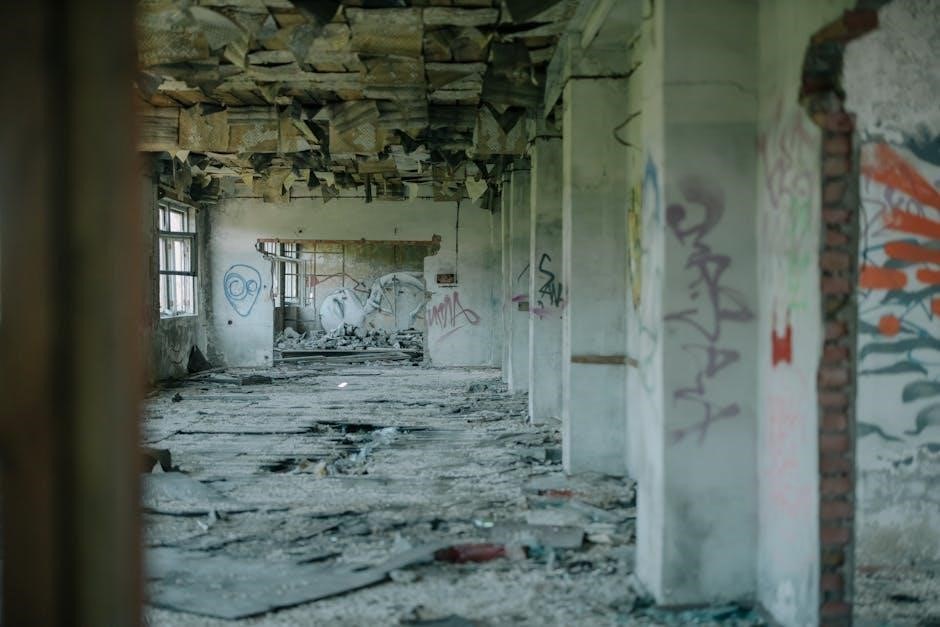Lynn Nottage’s Ruined is a powerful play set in the Democratic Republic of Congo during the civil war, exploring themes of resilience and survival through Mama Nadi’s brothel.
1.1 Overview of the Play
Ruined by Lynn Nottage is a haunting drama set during the civil war in the Democratic Republic of Congo. The play revolves around Mama Nadi, the owner of a brothel, and the women who seek refuge there. Through their stories, Nottage explores themes of survival, resilience, and the devastating impact of war on women. The brothel serves as a complex space, offering both safety and exploitation, reflecting the broader societal chaos. The characters’ lives intertwine as they navigate physical and emotional scars, highlighting the human cost of conflict. Nottage’s vivid portrayal of war’s brutality and the women’s struggles creates a deeply emotional and thought-provoking narrative, shedding light on the resilience of the human spirit in the face of unimaginable hardship.
1.2 Lynn Nottage’s Background and Achievements
Lynn Nottage is a Pulitzer Prize-winning playwright known for her compelling narratives on social justice and human resilience. Born in Brooklyn, New York, she gained acclaim for works like Fabulation and Intimate Apparel. Ruined earned her the 2009 Pulitzer Prize for Drama, solidifying her reputation as a leading voice in contemporary theatre. Her writing often highlights marginalized voices, particularly those of women and Afro-American communities. Nottage’s ability to blend raw emotion with political insight has made her a significant influence in modern theatre, addressing issues like race, gender, and conflict with unparalleled depth and sensitivity.
Historical and Cultural Context
Ruined is set during the civil war in the Democratic Republic of Congo, highlighting the devastating impact on women and their resilience in the face of conflict.
2.1 The Democratic Republic of Congo Civil War
The Democratic Republic of Congo Civil War, spanning over two decades, was fueled by ethnic tensions and the exploitation of conflict minerals like tin and coltan. This war led to massive displacement, violence, and human rights abuses, particularly against women, who became targets of sexual violence and forced labor. The conflict involved numerous armed groups and foreign interventions, exacerbating the humanitarian crisis. The war’s impact on civilians, especially women, is central to Lynn Nottage’s portrayal in Ruined, where the characters’ lives are shaped by the chaos and brutality of the conflict.
2.2 The Setting of the Play: Mama Nadi’s Brothel
Mama Nadi’s brothel serves as the central setting of Ruined, providing a complex space where survival and exploitation coexist. Located in the Democratic Republic of Congo during the civil war, the brothel is a refuge for women who have been displaced and traumatized. Mama Nadi, the proprietor, operates a business that caters to soldiers and locals alike, offering a temporary escape from the war’s horrors. The brothel’s environment reflects the broader societal chaos, with themes of resilience, exploitation, and the commodification of women’s bodies. It is both a sanctuary and a prison, highlighting the moral dilemmas faced by its inhabitants and their struggle to survive amidst war’s devastation.
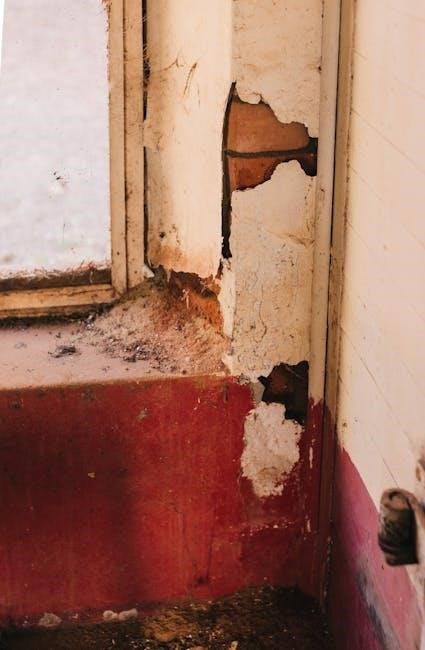
Major Themes in “Ruined”
Resilience, survival, and identity are central themes, exploring how women navigate war’s brutality, moral compromise, and societal expectations, highlighting their strength and humanity amidst chaos.
3.1 The Resilience of Women in War-Torn Societies
Lynn Nottage’s Ruined vividly portrays the resilience of women in war-torn Congo, where they endure unimaginable hardships yet find strength to survive and rebuild their lives. Through characters like Mama Nadi and the other women in her brothel, the play highlights their ability to adapt and resist oppression. Despite being physically and emotionally scarred, these women demonstrate extraordinary courage, resourcefulness, and solidarity. Their resilience is not just about survival but also about maintaining their humanity and dignity in the face of extreme violence and exploitation. This theme underscores the broader struggle of women in conflict zones worldwide, emphasizing their role as pillars of hope and reconstruction in shattered societies.
3.2 The Impact of War on Female Identities
Lynn Nottage’s Ruined profoundly explores how war disrupts and reshapes female identities, stripping women of their agency and forcing them into roles they never imagined. The play reveals the psychological and emotional toll of conflict, as women are torn from their homes, families, and traditional roles. Their identities are fractured by violence, exploitation, and the constant threat of death. The characters’ internal scars mirror the external devastation, as they struggle to reconcile their past selves with their present realities. This theme highlights the dehumanizing effects of war, which reduce women to mere objects of survival. Yet, even in the midst of such chaos, the play underscores their resilience and ability to adapt, though their identities remain forever altered by the trauma they endure.
3.3 Intersectionality and Afro-American Perspectives
Lynn Nottage’s Ruined delves into intersectionality, examining how race, gender, and class intersect in the lives of African women during the Congolese civil war. As an Afro-American playwright, Nottage offers a unique lens, bridging the experiences of marginalized women globally with those in Afro-American communities. The play critiques the exploitation of African resources and bodies, mirroring historical and contemporary struggles faced by Black women. Nottage’s perspective challenges simplistic narratives, instead presenting a multifaceted exploration of identity, oppression, and survival. By centering Afro-American voices, Ruined highlights the universal struggles of women of color, fostering a deeper understanding of their resilience and the systemic barriers they confront.

Key Characters and Their Roles
Mama Nadi, the brothel owner, alongside characters like Salima, Sophie, Christian, and Jerome, drive the narrative, each representing complex survival strategies and moral dilemmas in war-torn Congo.
4.1 Mama Nadi: The Mother Figure and Brothel Owner
Mama Nadi is the central figure in Ruined, owning a brothel in the Democratic Republic of Congo during the civil war. She is a complex, multifaceted character who serves as both a mother figure and a businesswoman. Her brothel becomes a refuge for women escaping the horrors of the conflict, offering them a semblance of safety and stability. Despite her tough exterior, Mama Nadi is deeply protective of her “girls,” demonstrating a maternal instinct that contrasts with the harsh realities of the war. Her role highlights the resilience and resourcefulness required to survive in such a brutal environment. Her character also reflects the moral ambiguities faced by those caught in the crossfire of conflict.
4.2 The Intertwining Lives of Female Characters
The female characters in Ruined are deeply interconnected, their lives shaped by the brutalities of war and their shared experiences in Mama Nadi’s brothel. Characters like Salima, Sophie, and Josephine each bring unique stories of loss and survival, forming a complex web of relationships. Salima, a former rebel captive, and Sophie, a young woman brutalized by soldiers, represent the devastating physical and emotional toll of the conflict. Their bond, forged in hardship, highlights the resilience and solidarity among women in war-torn societies. Through their interactions, Nottage explores themes of identity, trauma, and the strength found in communal support, offering a poignant portrayal of women navigating unimaginable circumstances together.
4.3 Male Characters and Their Contributions to the Conflict
The male characters in Ruined are central to the conflict, often perpetuating the war’s brutality and exploitation. Soldiers and traders, such as Christian and Harari, embody the violence and greed driving the civil war. Their actions highlight the economic and political motivations behind the conflict, particularly the trade of conflict minerals. These men frequently visit Mama Nadi’s brothel, seeking escape or exerting control, further entangling the women in the war’s chaos. Their presence underscores the cyclical nature of violence, where exploitation and power struggles fuel the conflict. Nottage portrays these characters as both perpetrators and victims, trapped in a system that perpetuates suffering, adding depth to the play’s exploration of war’s complexities.

The Brothel as a Central Symbol
Mama Nadi’s brothel symbolizes both refuge and exploitation, reflecting the duality of survival and oppression in war-torn Congo, while mirroring the societal chaos outside its walls.
5.1 The Brothel as a Safe Haven
Mama Nadi’s brothel serves as a refuge for women fleeing the brutalities of war, offering them a semblance of safety and stability in a chaotic world. Despite its morally complex nature, the brothel provides a space where women can find temporary reprieve from the violence and exploitation they face outside. It functions as a sanctuary, where they can survive and rebuild their lives, even if it means enduring the harsh realities of their circumstances. The brothel’s role as a safe haven highlights the resilience of the women, who find strength in each other’s company and shared experiences. This duality of refuge and exploitation underscores the play’s exploration of survival and sacrifice in war-torn societies.
5.2 The Brothel as a Reflection of Society
Mama Nadi’s brothel mirrors the broader societal dynamics of the war-torn Democratic Republic of Congo, revealing the exploitation and corruption that permeate all levels of life. The brothel, as a microcosm of society, exposes the commodification of women’s bodies and the moral ambiguities that arise in times of conflict. It reflects the societal breakdown, where even those seeking refuge are forced into exploitative systems. The brothel’s existence highlights the economic and social structures that enable such exploitation, drawing parallels to the larger conflict over resources and power. Through this setting, Nottage critiques the societal norms that allow such injustices to thrive, offering a stark commentary on the human cost of war and exploitation.
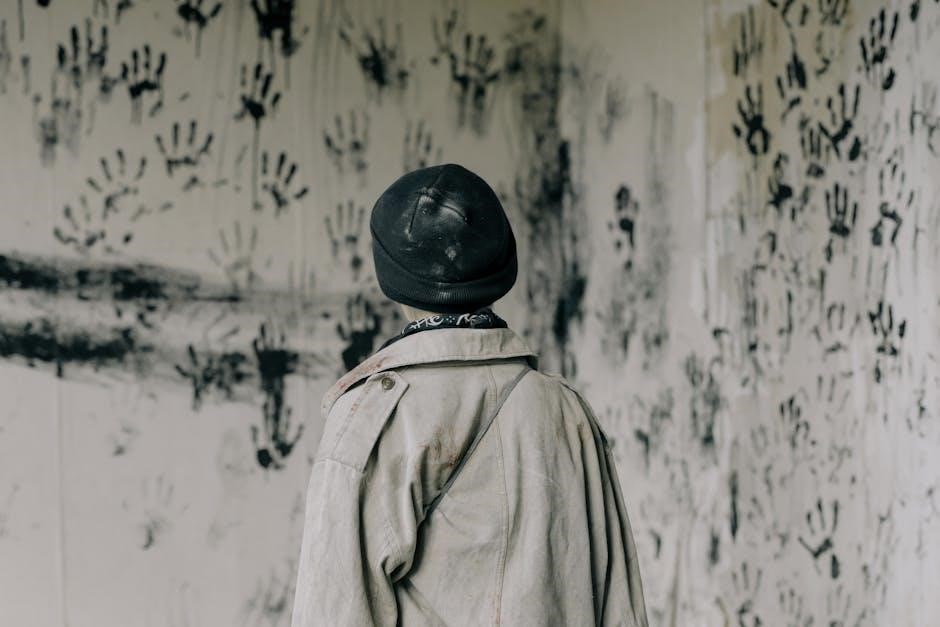
The Concept of “Ruined” in the Play
Lynn Nottage’s Ruined delves into physical and emotional scars, symbolizing the destruction of lives and identities in war-torn Congo, emphasizing survival and resilience amidst devastation.
6.1 Physical and Emotional Scarring
Lynn Nottage’s Ruined vividly portrays the physical and emotional scars of war-torn women in the Democratic Republic of Congo. The characters’ bodies bear the brutal marks of sexual violence, while their psyches are shattered by the constant trauma. Mama Nadi’s brothel serves as both a refuge and a reminder of their suffering. The play highlights how these women navigate their pain, often internalizing their scars as a means of survival. Nottage’s portrayal underscores the long-lasting effects of war on women’s identities, blending their physical wounds with emotional resilience. This duality is central to the play’s exploration of survival in a society torn apart by conflict and exploitation.
6.2 The Theme of Survival and Rebuilding
In Ruined, Lynn Nottage emphasizes survival and rebuilding as vital themes, illustrating how women in war-torn Congo find strength amidst devastation. Mama Nadi’s brothel becomes a symbol of resilience, where women rebuild their lives despite physical and emotional scars. The play explores how these characters adapt to their harsh reality, creating moments of humanity and hope. Through their stories, Nottage highlights the resourcefulness and determination required to survive. While the scars of war remain, the women’s ability to rebuild their lives underscores the play’s message of enduring human spirit. This theme resonates deeply, showing that even in the darkest times, the will to survive and rebuild prevails.

Dramatic Structure and Style
Lynn Nottage’s Ruined employs a raw, emotive dialogue style, blending harsh realities with moments of humanity. The play’s structure mirrors the chaos of war, yet maintains a haunting poetic tone.
7.1 The Use of Dialogue and Language
Lynn Nottage’s dialogue in Ruined is stark and evocative, reflecting the harsh realities of war-torn Congo. Her use of language captures the raw emotions and resilience of the characters, blending local dialects with poetic imagery. The conversations are often layered, revealing deeper truths about the characters’ lives and the societal context. Nottage’s choice of words emphasizes the humanity within the brutal environment, creating a vivid portrayal of survival and hope. The dialogue also serves as a tool for storytelling, weaving together personal narratives and collective experiences; This linguistic approach underscores the play’s emotional depth and cultural authenticity, making it a compelling exploration of human resilience.
7.2 The Play’s Emotional and Haunting Tone
Ruined by Lynn Nottage evokes a profound emotional and haunting tone, immersing audiences in the harsh realities of war-torn Congo. The play’s atmosphere is heavy with the weight of trauma, loss, and survival, creating a poignant resonance that lingers beyond the stage. Nottage masterfully interweaves moments of raw emotion with fleeting glimpses of hope, crafting a narrative that is both deeply unsettling and profoundly moving. The haunting quality stems from the characters’ struggles, their resilience, and the unspoken horrors they endure. This emotional depth is amplified by the play’s unflinching portrayal of war’s impact on individuals, particularly women, leaving a lasting impression on those who engage with the story. The tone is a testament to Nottage’s ability to balance the brutal with the beautiful, creating a work that is both haunting and unforgettable.

Critical Reception and Awards
Ruined received widespread acclaim, earning Lynn Nottage the Pulitzer Prize for Drama in 2009. Critics praised its emotional depth, vivid characters, and unflinching portrayal of war’s impact.
8.1 Pulitzer Prize and Other Accolades
Lynn Nottage’s Ruined won the Pulitzer Prize for Drama in 2009, a testament to its profound impact. The play also garnered other prestigious awards and nominations.
8.2 Reviews and Scholarly Analysis
Ruined has received widespread critical acclaim and scholarly attention for its raw portrayal of war’s impact on women. Reviewers praise its emotional depth and unflinching honesty, while scholars analyze its exploration of intersectionality and female resilience. The play’s ability to balance harrowing realities with moments of hope has been noted as a hallmark of Nottage’s writing. Academic studies often focus on the play’s historical context, particularly the Democratic Republic of Congo’s civil war, and its representation of women’s survival strategies. The availability of Ruined in PDF format has further facilitated its study in educational settings, making it a key text for discussions on gender, conflict, and social justice in contemporary theatre.
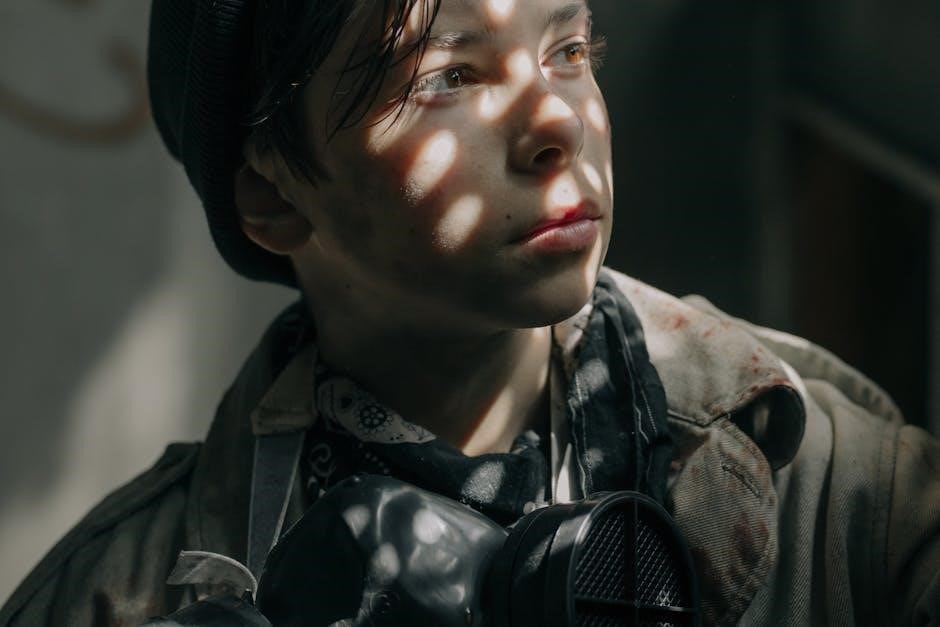
The Play’s Production History
Ruined was originally commissioned by the Goodman Theatre in Chicago. Its premiere in 2009 marked a significant moment in contemporary theatre, highlighting war’s impact on women.
9.1 Original Commission and Premiere
Ruined was originally commissioned by the Goodman Theatre in Chicago, with Robert Falls as Artistic Director. The play premiered in 2009, marking a pivotal moment in contemporary theatre. The production brought Nottage’s powerful narrative to life, showcasing the resilience of women in war-torn Congo. The premiere received critical acclaim, setting the stage for its broader recognition. This initial production laid the groundwork for the play’s success, highlighting the brutal realities of conflict and the strength of female characters. It established Ruined as a significant work in modern theatre, addressing themes of survival and identity.
9.2 Notable Productions and Adaptations
Ruined has seen numerous notable productions since its premiere, solidifying its impact on modern theatre. The play’s success led to its adaptation into various formats, including educational performances and international stagings. Its availability in PDF has facilitated widespread access, enabling theatres worldwide to produce it. The Pulitzer Prize win further elevated its prominence, attracting diverse audiences and inspiring new interpretations. Educational institutions have also embraced the play, incorporating it into theatre studies. These productions and adaptations highlight the play’s universal relevance and its ability to resonate across cultures, ensuring its continued influence in contemporary theatre and education.
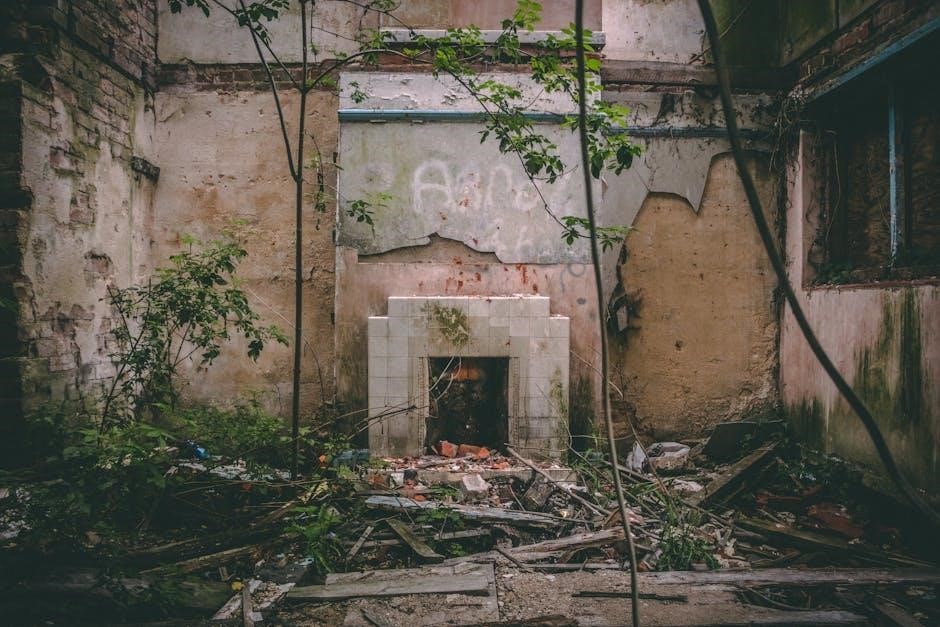
The Significance of the Play in Modern Theatre
Ruined shines a light on marginalized voices, addressing conflict minerals and war crimes. Its Pulitzer Prize win underscores its impact, making it a vital work in contemporary theatre.
10.1 Representation of Marginalized Voices
Ruined amplifies the voices of marginalized women in war-torn societies, offering a raw portrayal of their resilience and survival. Set in the Democratic Republic of Congo, the play highlights the struggles of women caught in the crossfire of civil war, emphasizing their strength and humanity. By centering their stories, Nottage challenges stereotypes and brings visibility to those often overlooked. The play’s focus on female identities and intersectionality resonates deeply, particularly through Mama Nadi’s complex character. As an Afro-American playwright, Nottage’s perspective adds depth to the narrative, ensuring that these voices are heard and valued. The Pulitzer Prize-winning work underscores the importance of representation in theatre, making it a landmark piece for marginalized communities.
10.2 Addressing Conflict Minerals and War Crimes
Ruined sheds light on the devastating impact of conflict minerals and war crimes in the Democratic Republic of Congo. The play underscores how the exploitation of resources like tin, coltan, and diamonds fuels the ongoing violence. By depicting the brothel as a space where soldiers and traders converge, Nottage exposes the interconnectedness of economic greed and human suffering. The characters’ stories reveal the broader consequences of these practices, from displacement to sexual violence; The play not only highlights the atrocities committed but also critiques the global demand for these minerals, linking local conflicts to international consumerism. Through its narrative, Ruined demands accountability and raises awareness about the human cost of conflict minerals.

Educational Resources and Downloads
Ruined by Lynn Nottage is available in PDF format, offering students and educators access to the play. Study guides and analysis provide deeper insights into its themes and characters.
11.1 Availability of the Play in PDF Format
Lynn Nottage’s Ruined is accessible as a PDF download, allowing readers to explore the play’s themes and characters. The TCG Edition offers a complete version of the text, ensuring accessibility for students and scholars. This digital format has become a popular choice for educational purposes, enabling easy access to Nottage’s compelling narrative. The PDF version is widely available online, providing a convenient way to study the play’s structure, dialogue, and emotional depth. This accessibility has contributed to the play’s widespread academic use, making it a valuable resource for those interested in contemporary theatre and its exploration of global issues.
11.2 Study Guides and Analysis for “Ruined”
Study guides and analysis for “Ruined” are available in PDF format, offering comprehensive insights into the play’s themes, characters, and historical context. These resources provide detailed analysis, aiding students and scholars in understanding the complexities of the narrative. The TCG Edition of the play includes supplementary materials that enhance comprehension of Nottage’s work. These guides are essential for academic exploration, making “Ruined” a widely studied text in contemporary theatre. By providing structured analysis, they facilitate a deeper engagement with the play’s exploration of gender, war, and resilience. Additionally, these guides often include essays and critical perspectives, enriching the understanding of the play’s significance. This accessibility has significantly contributed to the play’s popularity in educational settings, ensuring its themes remain relevant and thought-provoking for readers worldwide.
Lynn Nottage’s Ruined is a profound exploration of war’s impact on women, society, and identity, leaving a lasting impression on modern theatre and global consciousness.
12.1 The Lasting Impact of “Ruined”
Ruined by Lynn Nottage has left an indelible mark on contemporary theatre and global consciousness. Its unflinching portrayal of war’s toll on women’s lives resonates deeply, sparking crucial conversations about gender, power, and survival. The play’s emotional depth and vivid characters, such as Mama Nadi, have made it a seminal work in exploring the human cost of conflict. Its availability in PDF format has ensured widespread accessibility, fostering educational discussions and scholarly analysis. Nottage’s masterpiece continues to highlight the resilience of women in war-torn societies, challenging audiences to confront uncomfortable truths about violence and exploitation. Its influence extends beyond the stage, contributing to broader dialogues on human rights and social justice. Ruined remains a powerful testament to the enduring strength of women in the face of unimaginable adversity.
12.2 Lynn Nottage’s Continued Influence on Theatre
Lynn Nottage’s influence on modern theatre remains profound, as her works continue to address timely and universal themes. Ruined, in particular, has solidified her reputation as a fearless storyteller, shedding light on marginalized voices and the resilience of women in conflict zones. Her ability to weave complex narratives with emotional depth has inspired a generation of playwrights and audiences alike. Nottage’s commitment to exploring the intersections of race, gender, and power ensures her work remains relevant and impactful. The availability of Ruined in PDF format has further amplified its reach, allowing educators and scholars to engage with her work globally. Her legacy endures as a testament to the transformative power of theatre in addressing social justice and human rights issues.

